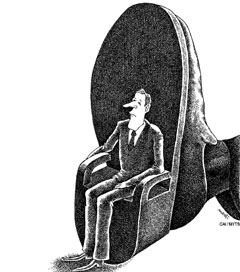The economist Adam Posen of the Bank of England gave a talk recently about British monetary policy that drives home a point I’ve been meaning to make: namely, that what’s happening in Britain on the monetary front right now is very much a teachable moment about monetary policy more generally.
The Bank of England faces the same kind of conflict between what it should be doing and what it’s under pressure to do that the Federal Reserve does, but in starker form. And if the Bank of England holds its ground, we should soon have a clear demonstration that one side is right and the other is wrong.
The story so far: Britain is currently experiencing relatively high headline inflation, more than 4 percent over the previous year. And so there are demands that the Bank of England tighten policy. Yet the bulk of the rise in inflation clearly represents temporary or one-time factors: a rise in value-added taxes as temporary breaks introduced during the recession expired, commodity prices, and the once-off effects of the fall in the value of the pound against the euro. Nonetheless, t0he inflation hawks demand a rate rise, arguing that despite the still very depressed state of the economy, inflation must be nipped in the bud or it will turn into stagflation, 1970s-style.
What Mr. Posen points out is that the case for pre-emptive monetary tightening to head off stagflation is entirely based on the 1970s experience; there have been no other similar episodes in history, before or since. And the situation in Britain today bears little resemblance to the situation preceding any modern takeoff in inflation. Given Mr. Posen’s data showing unit labor costs in the quarters preceding several modern British inflation episodes and this time around, it really does not look as if there’s much risk that this blip in inflation will turn permanent. On the other hand, there’s every risk that a premature tightening will ensure that Britain faces a lost decade or more. (Mr. Posen’s presentation can be found at the Web site of the Peterson Institute for International Economics, where he is also a senior fellow, at iie.com)
All the same issues apply in the United States, although in less extreme form: We didn’t have the value-added tax increase, but we did have the commodity shock, and the depreciation of the dollar has had some effect, although probably not as much as the depreciation of the pound.
What we can hope for is that the Bank of England stays the course; and when inflation in Britain drops sharply, as it almost surely will, that will be an object lesson in the folly of always setting policy as if it were 1979.
Truthout has licensed this content. It may not be reproduced by any other source and is not covered by our Creative Commons license.
Paul Krugman joined The New York Times in 1999 as a columnist on the Op-Ed page and continues as a professor of economics and international affairs at Princeton University. He was awarded the Nobel in economic science in 2008.
Mr Krugman is the author or editor of 20 books and more than 200 papers in professional journals and edited volumes, including “The Return of Depression Economics” (2008) and “The Conscience of a Liberal” (2007). Copyright 2011 The New York Times.
Thank you for reading Truthout. Before you leave, we must appeal for your support.
Truthout is unlike most news publications; we’re nonprofit, independent, and free of corporate funding. Because of this, we can publish the boldly honest journalism you see from us – stories about and by grassroots activists, reports from the frontlines of social movements, and unapologetic critiques of the systemic forces that shape all of our lives.
Monied interests prevent other publications from confronting the worst injustices in our world. But Truthout remains a haven for transformative journalism in pursuit of justice.
We simply cannot do this without support from our readers. At this time, we’re appealing to add 43 monthly donors in the next 2 days. If you can, please make a tax-deductible one-time or monthly gift today.
